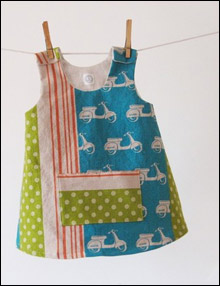Liz Koch, owner of the eco-friendly baby boutique Hatched in Jamaica Plain, recently had a sad little epiphany over the future of her business at a movie theater. In The Tale of Despereaux, a king, addled by his grief over the soup-related death of the queen, outlaws soup throughout the land.
"I was like, 'That's what it's going to be like,' " she says. "Some kid somewhere ate a lead-laden toy, and as a result, there's going to be nothing anywhere. All the beautiful toys will be gone."

BITE THIS: It's okay if you do, because this dress from Kiki Fluhr's Etsy shop is certifiably lead-free. |
Lead and dread
It seems inevitable that, unless the law is amended, there will be fewer children's products on the market, and fewer people making them. The largest manufacturers will survive, and pass their increased costs on to consumers. The rest will face difficult choices.With many different industries falling under the CPSIA umbrella, it's hard to get a handle on how much of the economy will be affected. But the brunt of the law's economic impacts will probably fall on the clothing and shoe industries, on which Americans spent $371 billion in 2007. By way of comparison, toys generated only about $23 billion in revenue in the US that same year, according to the Toy Industry Association. (On the other hand, the law will be a boon to product-testing labs — though manufacturers worry that there will not be enough labs to handle the coming deluge of products.)
A recent story in BusinessWeek estimated that there are more than 46,000 one-person businesses in the US making clothing or children's toys. Microbusinesses are out in force on the Internet, rallying fierce opposition to the CPSIA. One Web site, endangeredwhimsy.com, is maintaining a keepsake gallery of handmade clothes and toys that could be effectively banned by the new legislation.
Larger businesses are getting organized as well. New trade associations are springing up, like the recently formed "CPSC Legwear Coalition," whose members felt it necessary to declare in a recent press release that "lead is not commonly used in legwear manufacturing." Publishers are incredulous at the very idea that books could contain lead; bicycle makers express disbelief that anyone would suck on a bike tire. Until the CPSC's recent stay of enforcement, the American Library Association was pleading with both Congress and the CPSC to exempt libraries, schools, and museums from the law before February 10 — if not, they said, libraries would have to ban either children or their books.
Increasingly, children's product makers, stymied by the law's complexity and the impossibility of compliance, are calling for the whole thing to be scrapped.
"There's a growing sentiment that an exemption here and an adjustment there isn't going to be enough," says Wilson. "We almost need a complete repeal of the law."
Lawyer Michael Gidding agrees. A 30-year veteran of the CPSC, now in private practice in Washington, DC, he says that his former colleagues believe the law is overkill.
"If Congress is under the Pollyannaish impression that people are going to pay for all these tests and not pass the costs on," he says, "they're smoking something."